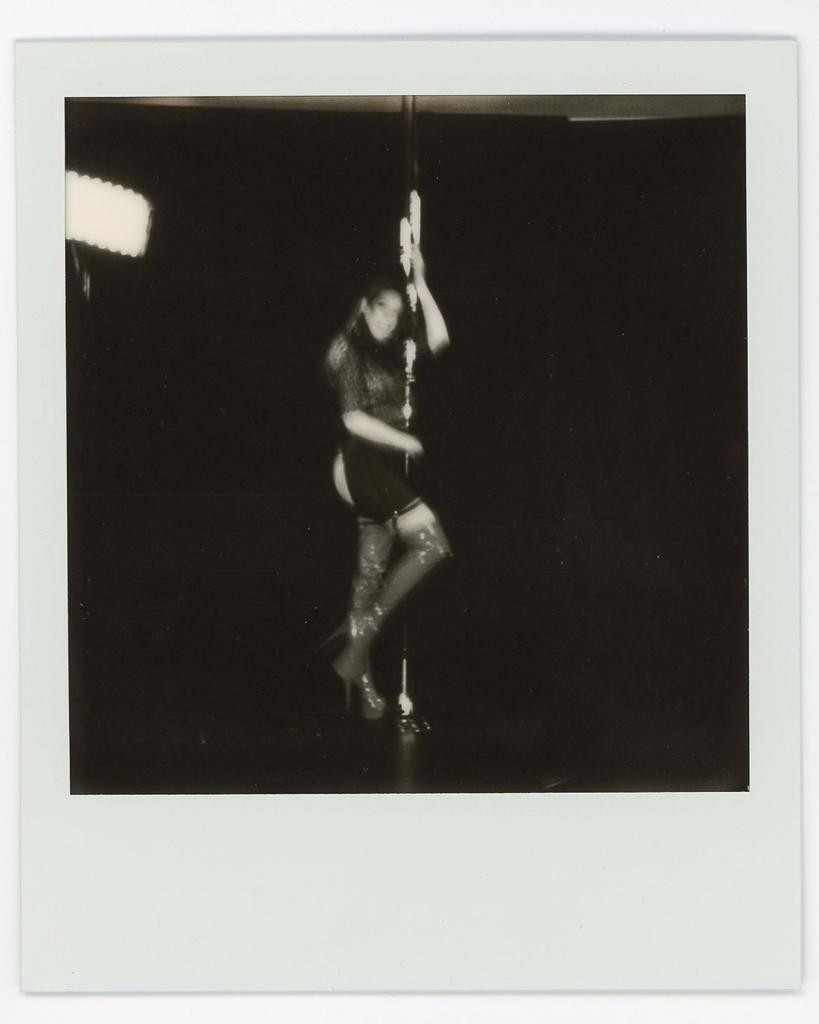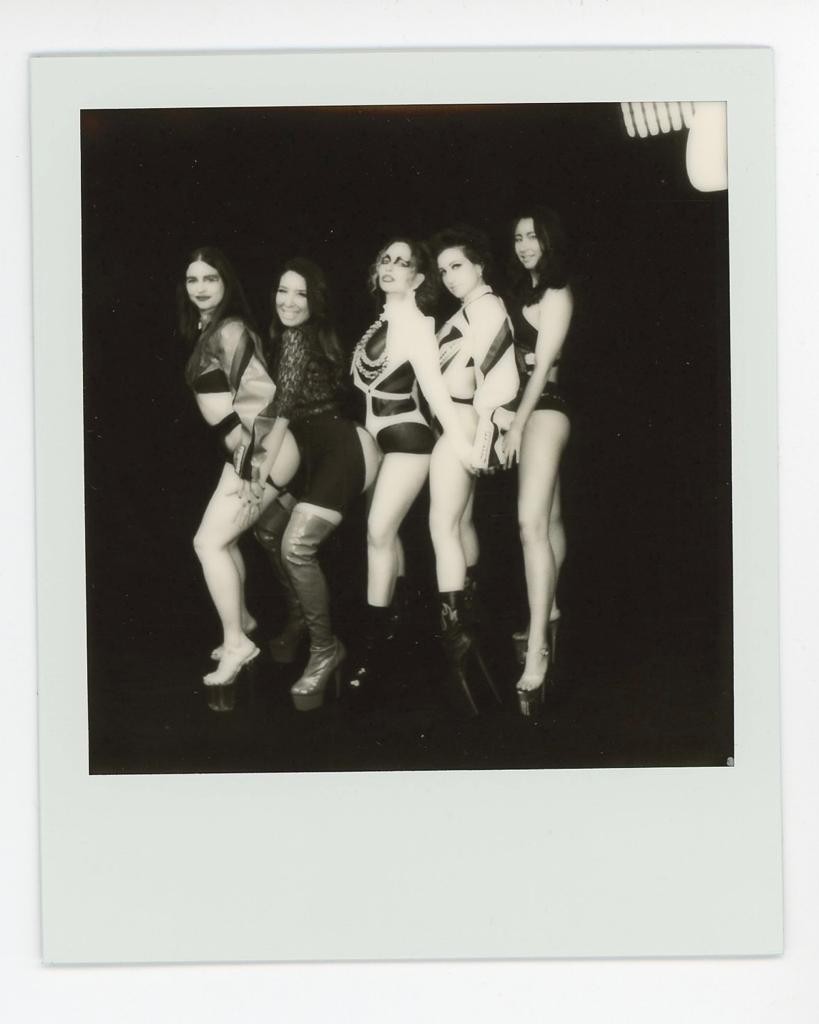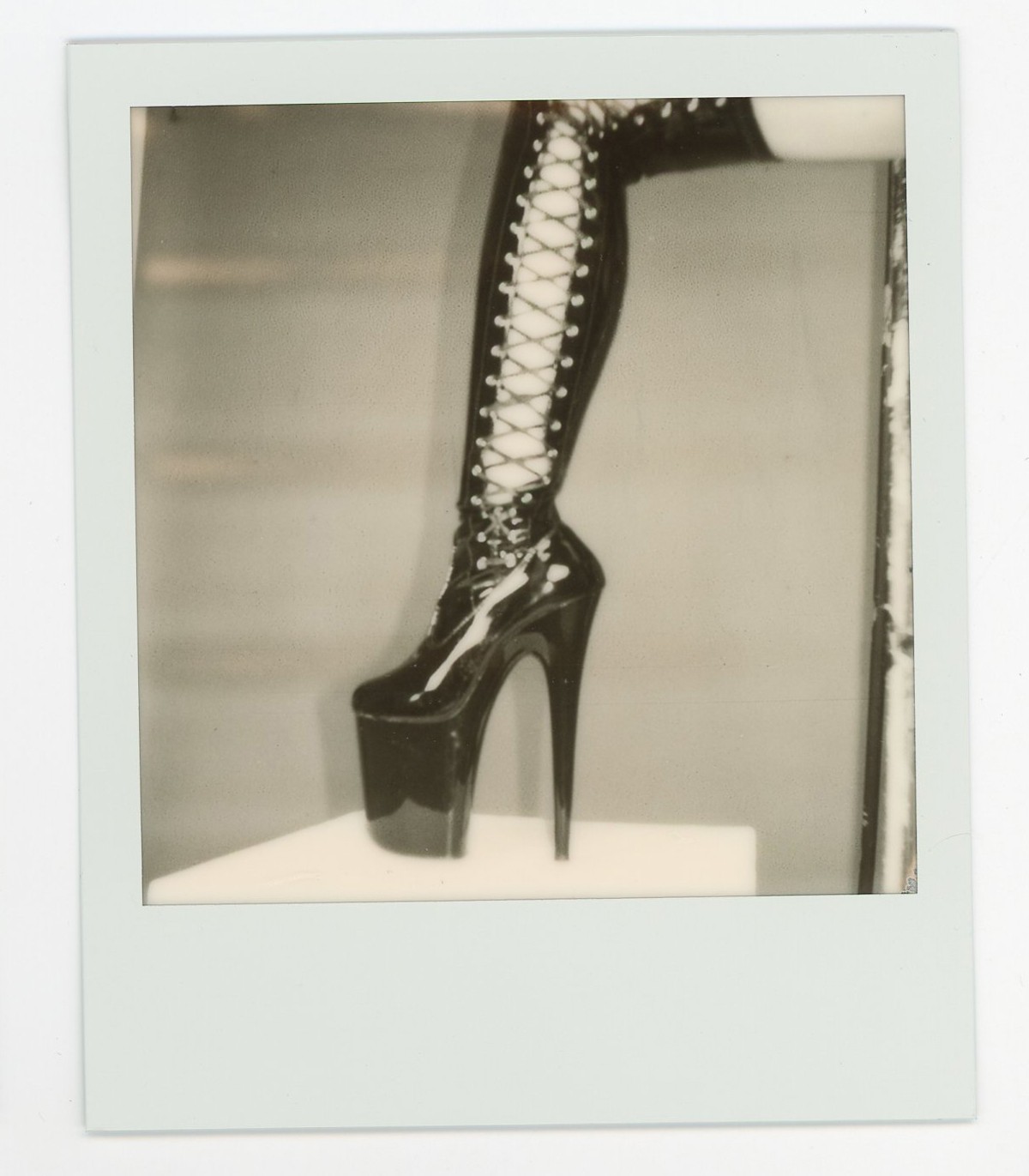In conversation with CHIQUI LOVE and EDIE MONTANA


What do you do when the world cannot stop talking about you, but refuses to talk with you? The BERLIN STRIPPERS COLLECTIVE came together in order to speak for themselves — whether it be against power-structures within the industry, social media platforms, or legislation. The group has been featured in Dazed Magazine, Vice, as well as being recognised as actors at the esteemed SCHILLER THEATER in Berlin for their Stripper Stories. A visually stunning expression of both activism and art, the collective is a safe space for Sex Workers from all ranges of identities — prioritising the autonomy and safety of the human body. I first discovered the collective through an online seminar regarding the increased presence of online sex work during the pandemic. Instantly enthralled by the collective — their workshops, events, and shoots displayed an exemplary level of creativity, humor, and true unity among its members. As the COVID measures were alleviating, and the nightlife seemed to be gaining its footing back, I was curious to see what the collective was up to, and eager for a bit more context as to how it came about. In perfect harmony with the theme of this issue, speaking with the collective became integral. So, I shot my shot, reached out, and got to set up a girls’ chat where we could brainstorm, ask questions, and delve deeper into common interests and goals. I spent the next week conversing with CHIQUI LOVE and EDIE MONTANA — two out of three of the founding members of the collective — on their experiences, values, and the steps that needed to be taken in order to make the night a safe and sexy space for everyone.

CHAPTER ONE: LETS TALK
Alia: Hey Everyone! ALIA here. Thank you so so much for giving me a peek into what you guys have been getting up to. I hope you’re all doing good today? I actually met you guys through a Zoom panel with the non-profit, OUR BODIES OUR VOICE, so it’s super amazing to be able to speak one on one!!
Chiqui: Hi Alia, lovely to speak with you! Chiqui here.
Edie: Hi it’s Edie here! Aaaah yes I remember that! It was super lovely to speak to you all . Thank you for having us!!!
CHAPTER TWO: DEEP IN THE DOUBLE STANDARD
Alia: That talk was such an eye-opener! Especially taking into account the world’s many transitions. A recent one that comes to mind is OnlyFans almost banning nudity on the platform a few months later. One of 2021’s biggest back-tracks?
Edie: Right! It’s honestly not suprising though — OnlyFans relies on payment methods that have an “anti-pornography” (a.k.a. anti sex work) policy. All platforms that rely on Mastercard & Co have this kind of controversy. PayPal will even shut down your account if they find out you are a sex worker…
Alia: Audacious as fuck tbh. It is so beyond their realm of responsibility what people will spend their money on. But since sex work online — and generally — is so (selectively) monitored, has being in a collective helped navigate this battle? Or maybe, it actually creates more of a target?
Chiqui: I don’t think it matters if we are an individual or a group. In fact, we started a backup account… just in case. There is a double standard when it comes to explicit/sexy content; Playboy Magazine and celebrities like the Kardashians can post racy pics with no consequences.
Edie: Exactly — and unfortunately, being in a collective doesn’t protect you from this. We still censor every explicit word that could get us banned on Insta ($tr1pper instead of stripper, for example). Only famous people don’t get targeted.
Chiqui: It is also important to note how gender plays an important role — many S.W’s have had to change their profile to “male” in order to avoid being so scrutinised with their content.
Alia: At least A.I. hasn’t gotten too smart to tell the difference yet . The algorithm is so trash for this though.
Edie: It’s the usual story: showing male nipples is fine, but our nipples are not.
CHAPTER THREE: SEARCH AND SUSPEND
Alia: Do you guys think Instagram (or an alternative platform) will ever develop a change here? In which the monetary aspect of sex work is taken as seriously as projects people such as (I hate to say it) but, whatever someone like Kylie Jenner is pushing? It’s just so ridiculous that someone who is so prevalent on the algorithm can get away with a full body shot — even shoots just covered in gold paint — without any consequences, but if a pole is in frame, your account gets suspended.
Edie: The issue with social media is just a lot more complicated than people realise, and everything is because of a US law called SESTA/FOSTA. The US has this amazing [sarcasm] anti-trafficking law, which forbids all kinds of sex work online and they don’t make any distinction between sex work and human trafficking — they consider all kinds of sex work human trafficking.
Alia: Yeah, because that is a COMPLETELY appropriate comparison… sure….
Edie: Right? That’s why we cannot post any pornographic material (or anything that could be soliciting services related to sex work). Of course the law was passed precisely because it was presented as an anti-trafficking law, and naturally no politician would want to vote against it. However, what they’re actually doing is silencing sex workers, with the goal of erradicating sex work entirely.
Alia: Of course, no actual sex-workers were consulted. It’s just really sleazy to use such an important issue to try to disenfranchise people — especially when you consider how many US politicians have been photographed at like, Epstein’s island for example. They’re not doing enough to actually protect people who are being trafficked, but then use them as a scapegoat to put Sex Workers in an even more vulnerable position. Like, how has this law even helped?
Edie: The first biggest consequence of these laws was that all the online platforms that sex workers used for screening customers, for example, and publishing warnings concerning dangerous customers, got shut down — which was terrible.
Alia: That’s LITERALLY exactly the opposite of what laws that are meant to protect people should be causing.
Edie: It just made our work more dangerous, and it became really impossible for escorts to advertise online. These laws just pushed everything more and more underground — if they don’t respect that law, they’ll be sued and made to pay a lot of fines.
Chiqui: Sex worker friendly websites DO exist already though, but unfortunatley they aren’t as popular or visible. There is SWITTER, for example.
Chiqui: The big ones have a monopoly over who controls all the social media channels. So that’s a pretty huge monster to fight.
Edie: Also, the practical problem is that even if smaller platforms start, they still have to follow those laws — small platforms can’t afford those lawsuits.
Alia: I mean, Twitter was literally being sued by The National Center on Sexual Exploitation for allowing and profiting off of human trafficking earlier this year — the law does literally nothing to stop the problem it claims to be targeting.


CHAPTER FOUR: (DE)SILENCING SEX WORKERS
Alia: I think one of the things that drew me to you guys the most was the fact that, despite all of these algorithmic hurdles, you guys have such a strong social media presence. A bunch of influencers have like an OnlyFans, for example, but it’s very rare to find influencers who are primarily Sex Workers. What was the catalyst marking the beginning of Berlin Strippers Collective?Like how did you guys meet and what made you guys decide to form a coalition like this?
Edie: A performance back in July 2019. We started thinking: “Hey, instead of doing this as individual strippers, we could do it as the Berlin Strippers Collective.” Then in November of that same year, we had our very first event as the official Berlin Strippers Collective: a live drawing event. We were all shocked because, despite being our first event, the club was so full — there were barely any seats left. The energy was so nice, so yeah, after that we just started and things escalated.
Alia: Amazing — and a beginning success like this only reaffirms that you’re on the right track to personal fulfillment.
Chiqui: Also Stripper Stories, which I am extremely proud of. It humanises us, shedding stigma as we tell stories on our own terms — which is rare.
Alia: This is such a restorative yet, I imagine, quite an informative, funny and emotional experience all wrapped into one. Every time I see you guys post pictures from the events, like when you’re promoting an upcoming session, it always looks like everyone is having the time of their lives! I especially love the one of you guys getting your armpit licked by someone in an old-man mask hahahahah — like, I REALLY want to know the story behind that hahahha.
Chiqui: Hahah some of the stories are hilarious, and then some of them are very touching — some of them are just real, you know? And in the recent months, we have decided to open it not just to strippers telling their stories, but also people from the industry. We have had a dominatrix, porn stars, transgender sex workers, and so on … it’s been fantastic. We’ve covered many things, including tough subjects, such as pretending to have money all the time in order to attract money, which has been super interesting.
Alia: Essentially manifesting money through the power of certainty. I feel like things such as the law of attraction have been popularised recently — especially with media such as The Secret being on Netflix, which really centers around summoning money into your life.
Chiqui: We live in a society where you have to look a certain way and pretend that you are a certain way — like “Oh my god, I have this sugar daddy who spends so much on me”. Maybe that’s bullshit, but maybe that’s what you need to do in order to attract money — nobody really wants to see a sex worker who isn’t making money, you know?
Alia: This practice of attracting money, then, can be quite a fine line. A balancing act of manifestation and transparency — it’s definitely something I think many people are currently battling with social-media’s fallacies. I know I definitely need to be calling some of that money into my life right now :’’’)
Chiqui: There’s this porn star that we know who has 50K followers, but it’s basically just like a smoke screen — people think “Oh my god, she must be making so much money cause she has all those followers”, but one day, she told me “Chiqui — during the pandemic I was struggling just like everyone else. My rates haven’t really changed for a long time. People aren’t booking me just because I have all those followers”.
Alia: It is essentially a game of smoke and mirrors, and having events such as the Strippers Stories allows for a safe space for people to be honest about the monetary reality of S.W. I can totally feel why creating such a space within the collective is a notable moment for you! It’s refreshing to hear the honest reality being voiced within the community.
Chiqui: Yes. It also gave us the opportunity to discuss gender diverse people in the sex industry — as a lot of our members are non-binary and have to pretend to be this hyper-femme persona in order to work and make money.
Edie: Through Stripper Stories, guests realise that our struggles are actually normal peoples’ struggles, you know? We are no monsters. I was also honored to be part of OVERMORROW; a huge, immersive, art and performative exhibition organized inside the techno club, WILDE RENATE. They couldn’t open during the pandemic, so in order to give jobs to the artists out of work, they used every room of the club for this immersive, performative exhibition.
Alia: This reminds me of one of the things I saw gain a lot of popularity during the pandemic, which was almost a revival of the drive-in movie theater experience. It’s not the “normal” way to consume art, but it works within the parameters of what’s possible with social distancing rules etc. I think one of the things Glamcult has been so excited about with everything opening up again is exactly this ability to give jobs and exposure to artists!
CHAPTER FIVE: OLD FASHIONED WITCHCRAFT
Alia: I saw on Instagram that you guys are hosting an event for Halloween, Murder on the Whorient Express. I’ve also been seeing you guys post some stories with candle magic, tarot — lots of mystical elements. As a collective, is there a relationship between spiritual practices and the work that you do?
Chiqui: For strippers, mysticism is definitely present. It’s not unusual for strippers to blame mercury in retrograde for not making money, or on your birth chart. It’s also not unusual for strippers to have their favorite outfit — or their favorite color — which they believe to be a good luck charm. For example, a lucky blue set of underwear. It’s also not unusual to hear changing room conversations about witchcraft. There is a coven- sense in our collective, many times we do rituals that are not necessarily that specific but when we all hang out, we tend to sit in a circle, and cackle like witches.
Alia: Definitely a coven — people coming together to enhance their power as individuals is definitely something we need to see more of. I think that society has just taken such an individualistic turn, it’s nice to see that our strengths are all the more impactful when they’re supported by others.
Chiqui: Yes Haha. I also refer to the collective as coven because it’s gender neutral and we all work in magic, right? Transforming sex energy into money energy and vice versa, so old-fashioned witchcraft — I think what we do is pretty powerful.
CHAPTER SIX: WHAT A NIGHT
Alia: I wanted to know, how has your relationship with ‘nightlife’ changed since you started working in the sex industry? I worked as a bartender for a while, and my relationship with going out and drinking was completely changed by the hours I was free (you work in the evening when everyone else is going out), and also the feeling of basically just going back to work — like “God, will I ever spend another evening not in a bar”???
Edie: My relationship to nightlife changed a lot because of stripping. Stripping is socially exhausting, you’re constantly talking to people — and it’s always small talk like “Hey, what’s your name? Where are you from? How are you doing?”, but we do that because we’re paid for it… Because it’s our job. But this means that when I go out with my friends during my free time, I don’t want to meet strangers anymore. I became really antisocial.
Chiqui: I’m very lucky that I managed through my art — stripping and pole dancing — to work at the club nights where I was also partying. For me, our gigs just feel like going out, but it’s even better because we are getting paid. When people piss us off, we have our own little room where we can have our drinks. We essentially get to chill out and disconnect from the big crowd outside. So, I have become very diva-like: I only like going out to clubs where I know I’m going to have access to the backstage hahaha.
Alia: I’m sorry, this isn’t called being a diva — it’s you creating a standard and learning to put your needs first
Chiqui: Exactly
Alia: So true.

CHAPTER SEVEN: CYBER TEASE OR WHORE FOODS?
Alia: Naturally I’ve been following you on Instagram since the OBOV panel, so it’s been so nice to see you be able to promote your events, as well as just read your captions that deal with Sex Work and feminism, issues with glamorising Sex Work, and other important topics relating to the industry. As a collective, do you have any concrete values or missions that you seek to tackle — or issues you want to highlight?
Edie: On a larger scale, our goals are to destigmatise the sex industry, and to advocate for it’s decriminalisation. On a smaller and more local scale, the collectives’ goal is to create a platform which is safe for sex workers — where they can express themselves and express the creative side of the job.
Alia: Naturally there are so many ways to achieve all of these things, but collectives such as yours are key. What are some other S.W. initiatives you’ve seen that really impressed you?
Chiqui: I’m loving how sex workers are self-organising; it seems like the pandemic has really brought groups of sex workers together. For example, EAST LONDON STRIPPERS COLLECTIVE were a big inspiration for us (and I think are now a Union). There was also an event called Cyber Tease, where sex workers created virtual strip clubs. Some dancers back in the US were doing drive-through strip teases — which was hilarious — and people put tips in a bucket; the event made world news. Here in Berlin there is a group called CAREER GXRLS, as well as this event called Whore Foods (so it’s like Whole Foods, but with an r, which is funny), and they cook little dishes together. They’ll make things like Pasta Puta-nesca, you know? Or like Cream Pies — things like that. It’s a bunch of sex workers — especially people of color in the sex industry — getting together to cook. So I thought that was really nice. It was an amazing intitiative started by FRAU DARK (@thedarkfrau on Instagram).
Alia: It’s reassuring that during these tough times, people have still come together to create such sick projects.
CHAPTER EIGHT: INSIDE THE CLUB
Alia: There are so many battles fought by people in the industry that either the general public isn’t aware of, or actively refuses to acknowledge. For example, dealing with the anti-trafficking laws and social media, as well as accessing the right resources. How do you deal with what can be such an isolating experience?
Chiqui: Because of the stigma of our industry, there are many people who feel extremely lonely and alienated. They cannot tell their family, or close friends because of their fear of being shamed and stigmatised. I used to think that maybe having a venue would help, but I don’t know, because this would have to be very radical to insight change.
Alia: A venue would provide a level of autonomy, but as you say, it is hard to conceptualise something that could work universally.
Chiqui: I feel like having a bunch of dancers in a small space, fighting for the attention of a guy, taking 60-80% of their commission, and having them there from 9 PM till 8 AM in the morning is ultimately damaging. But a main goal for me is to keep inspiring all the sex workers to self organise, to stop giving money to all these managers who are exploiting us, and feel like we are a collective where people can come and feel safe — whether that is when they perform with us, hang out with us, or even if we can just giving them a glimps of hope that things can be different. We need to work together.
Alia: When it comes to a lot of these issues, it’s often framed in a way that connotes a hive-mind — where everyone’s experiences are the same. While some people might hate their jobs, other people really enjoy it and see it as a creative outlet. Even then, sometimes the media implies that it’s the job itself that makes sex work degrading, rather than maybe management at specific clubs, these anti-sex worker laws, and even just the media THEMSELVES for implying that everyone’s experiences are the same. It’s important to highlight the individual experiences of Sex Workers because it’s really hard to help, or create a concrete plan, for a bunch of people who work in the same industry, but do it for completely different reasons.

CHAPTER NINE: DON’T DESPAIR
Alia: On that note, I feel like the work that you guys do is so amazing especially because you hold all Sex Workers’ experiences to the same degree of importance. A lot of your captions on Instagram discussing these industry issues also directly address those in your field, offering empowering insights into how to cope with these issues — in a way that you don’t often see compared to other fields. What advice would you give to people who feel isolated in their experience with sex work, and also to those who are just starting out…
Chiqui: Self-organise: for example, back in London there was a government-funded sex workers meeting every Wednesday. We would give pole dancing lessons, and it was like a brunch outing — we would meet around 12, and then we would have muffins and coffee; it was here where we made friends and connected. These kinds of government funded projects are really important, because they provide a safe space where sex workers can actually get to know each other, and meet other people in a similar situation.
Alia: Wow that’s amazing! Is there a space like this in Berlin? I know in Amsterdam there is the SEKSWERKEXPERTISE, alongside RED LIGHT UNITED.
Chiqui: Here in Berlin we have a really cool association called HYDRA, and they do sex worker meetings often — and in different languages too, because a lot of the sex workers here are actually immigrants. But depending on which city you are in, there are associations that will provide you with spaces where you can go to meet people and ask any questions. There’s a lot of online forums on Facebook/social media too, with quite a few groups dedicated just for strippers. It’s also important to keep in mind, when searching the internet for groups, you have to be careful with the words that you use. You can’t use the word ‘sex’ anymore, you have to put the s and a 3 and something else [s3x; seggs; etc] — you constantly have to play around with the language that you’re using, and it’s becoming harder and harder to find people in the industry because of all the hoops you have to jump through in order to access that information.
Alia: It’s so important that there are so many community-based initiatives that are set up by the government, but still so shitty that the algorithms and platforms are targeting resources that can be so vital to the safety of people in the industry :///
Chiqui: But it’s still possible! And yes, do not despair; just stay patient, because the right friends that will get your story will come with time — but it can be very isolating and very heartbreaking to lose members of your family and close friends because you have chosen this profession. But yeah, I found love and support among my community. I have friends with whom I can be 100% myself, but also our community can be quite harsh with each other sometimes, so yeah. It’s a difficult one.
Edie: I completely agree
Alia: I think that’s also why the way you all candidly discuss these issues is so important — even just mentioning all of these alternative spellings, and other ways to work around the system, can be so useful for people who are just starting out and are trying to figure out a way to find the hidden online-community.
CHAPTER TEN: ONE LAST THING
Alia: Thank you guys so much for taking the time to share your stories and educate me on these industry specific issues — I really hope that by having these conversations, we are able to shake off the stigma, as well as showcase what true sexual liberation needs to look like. If there are any closing statements you want to make — any points that weren’t raised in any of the questions that you think are important to talk about and you would like to use our platform to discuss — just go right ahead!
Edie: Thank you so much for having us and for the great questions! Maybe one last point to wrap up is how what we really want people to understand is that, as long as there are laws that police sex work and criminalise sex work — or that censor it, that’s the reason why our jobs are unsafe. So we’re always going to advocate for the decriminalisation of sex work, and once we reach that goal, our lives would be easier and our jobs would be safer as well.

Notifications